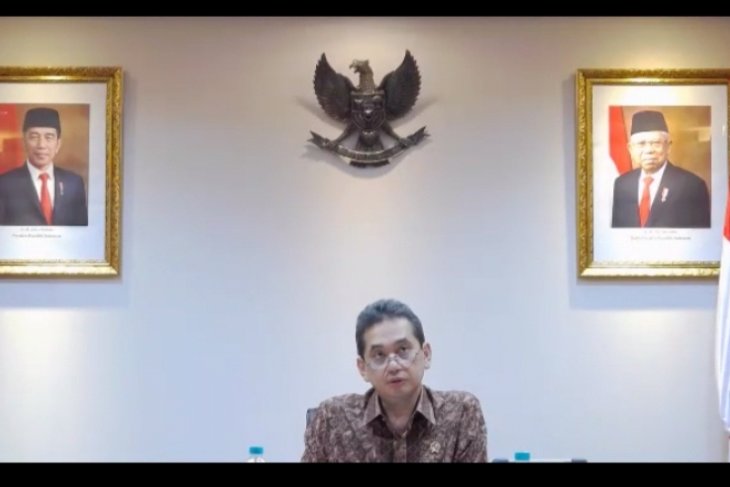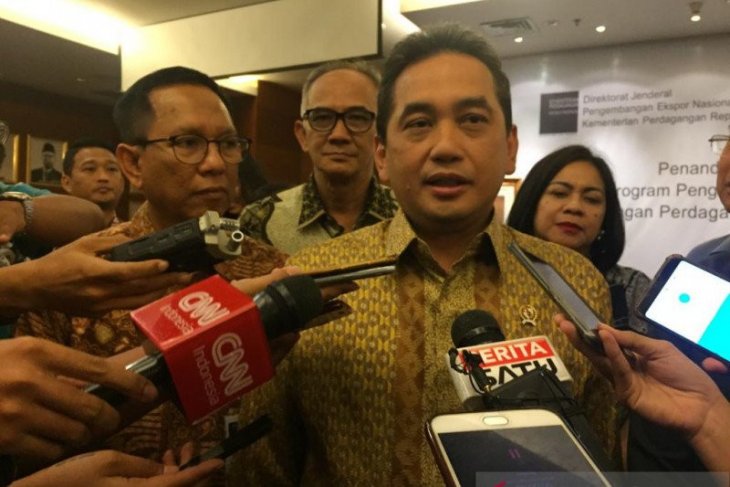Live Streaming
Program Highlight
Company Profile

Ani Hasanah
June

Minister of Trade, Agus Suparmanto. (ANTARA/Aji Cakti)
Indonesia’s Minister of Trade, Agus Suparmanto, has expressed the hope that the reopening of retail businesses and shopping malls, with the implementation of health protocols, would help revive economic activity in the new normal era.
"There is indeed a drastic decline (in trade), at the moment, due to the COVID-19 pandemic situation. For that reason, economic activities need to be reactivated through the opening of retail businesses and shopping centers, while still prioritizing health protocols," Minister Suparmanto said during a virtual discussion on Thursday in Jakarta.
The minister stated that he has been monitoring the situation following the reopening of shopping centers a few days ago, and added there has been considerable enthusiasm from the public over malls opening their doors again.
In the current situation, amid a pandemic that has spread across the world, including in Indonesia, there needs to be prompt response in the face of COVID-19, he remarked.
The Indonesian government has continued to give priority to public health security and safety in every activity, including trade, he pointed out.
"In this (current) scenario, health protocols are very important and there needs to be awareness and strict discipline in carrying out trade activities, especially in modern retail and shopping centers," he continued.
He further said there has been a significant decline in trade in the past two months due to the number of inactive retail businesses.
The COVID-19 pandemic has shifted how people engage in social activities, including trade, he said. People are now required to wear masks, maintain a safe distance, and wear gloves. They also need to frequently wash their hands and avoid unnecessary contact with others.
He further said that, at the moment, the DKI Jakarta government and Governor Anies Baswedan are implementing health protocols well.
"Hopefully, this can be an example (to others) and can be sustained, so that retail revenues can increase after two months of closure," the minister said. (ANTARA)
June

Minister of Trade Agus Suparmanto. ANTARA/Mentari Dwi Gayati.
Indonesian Trade Minister Agus Suparmanto drew the attention of retail businesspersons to adapt to the digital ecosystem in the new normal period.
"What I want to remind everyone is to push the retail business to adapt to a smoother transitioning in future," Suparmanto noted during a virtual discussion in Jakarta, Thursday.
The minister opined that retail businesspersons should not solely concentrate on offline business but also migrate to a digital ecosystem, through a combination of online and offline platforms.
Suparmanto reminded all elements of society, including consumers and sellers, as well as management of retail businesses to persistently apply stringent health protocols.
"I think with the new normal, we need to harbor a new spirit. Hopefully, what we strive to implement would proceed smoothly," he stated.
The Ministry of Trade had earlier confirmed that it will issue a trade ministerial decree to ease electronic business activities.
Minister Suparmanto explained that the soon-to-be-issued decree is derived from Government Regulation No. 80 of 2019 on Trade through Electronic System issued to boost sustainable e-commerce in the country, local-made products, and exports through online means.
The ministry stated that the decree will soon be issued to protect businesspersons and consumers after taking into account dynamic developments in electronic trade. (ANTARA)
June
 Industry Minister Agus Gumiwang Kartasasmita. ANTARA/HO-Industry Ministry/sh
Industry Minister Agus Gumiwang Kartasasmita. ANTARA/HO-Industry Ministry/sh
Industry Minister Agus Gumiwang Kartasasmita drew attention to the fact that foreign investors had brought up the two issues of land and labor before they invest in Indonesia.
"What I gauged from my visit to some countries to promote investment is that foreign investors have highlighted the two issues," Kartasasmita noted during an online seminar here on Thursday.
The minister pointed out that the two issues were discussed during a deliberation of the draft omnibus bill on job creation.
"Investors have applauded the draft bill on job creation for facilitating a more conducive investment climate," he stated.
Indonesia, with its huge population, has the opportunity to attract investors to relocate their factories from China, the minister noted.
"They surely will be attracted to invest (in Indonesia), as we have a vast population," he pointed out.
To this end, Indonesia will need to create a conducive climate for investment to attract more foreign investors, Kartasasmita stated.
The omnibus bill on job creation was proposed by the Indonesian government, and its final draft was submitted to the Parliament in February this year. The bill will amend 73 prevailing laws on business and investment as well as regulations on manpower, bringing them under a single law.
Supporters claim that the bill aims to boost domestic and foreign investment inflows while creating a more attractive investment climate in the subsequent five years since the president’s re-election last year. (ANTARA)
Indonesia aims to continue promoting the global development agenda of 2030, including the Sustainable Development Goals (SDGs), after being elected as a member of the United Nations Economic and Social Council (ECOSOC) for 2021 to 2023.
"Becoming a member of the ECOSOC serves as a substantial opportunity for Indonesia to contribute to promoting the 2014 Agenda, and ensuring that no one is left behind in the process," said Permanent Representative of Indonesia to the United Nations, Dian Triansyah Djani, in a statement received by Antara News Agency in Jakarta on Thursday.
Djani said that during its three-year term as ECOSOC member, Indonesia will focus on promoting inclusive and sustainable development.
Indonesia will also continue to encourage ECOSOC to become more relevant, transparent, effective, and efficient in responding to global challenges in terms of economic, social, and environmental development, he said.
Indonesia received 186 out of 190 votes during the election of ECOSOC members, held by the UN General Assembly at the UN Headquarters in New York on Wednesday, June 17, 2020.
Indonesia is representing the Asia Pacific Group at the UN body, along with Japan and the Solomon Islands.
Nigeria, Liberia, Madagascar, Libya, and Zimbabwe have also been elected and are representing the African group, while Bulgaria is representing Eastern Europe in the membership.
Argentina, Guatemala, Mexico, and Bolivia are representing Latin America and the Caribbean, while Portugal, France, Austria, Germany, and Great Britain are representing western Europe and other countries.
"In the last few years, Indonesia has won the candidacy for a number of vital councils in the United Nations, including the UN Security Council, UN Human Rights Council, and today, in ECOSOC. This (achievement) truly proves the substantial confidence from the international community towards Indonesia's track record, roles, and progress in the multilateral forum," said Ambassador Djani.
ECOSOC is one of six main bodies of the UN, and focuses on encouraging international cooperation in social, economic, and development sectors. (ANTARA)


